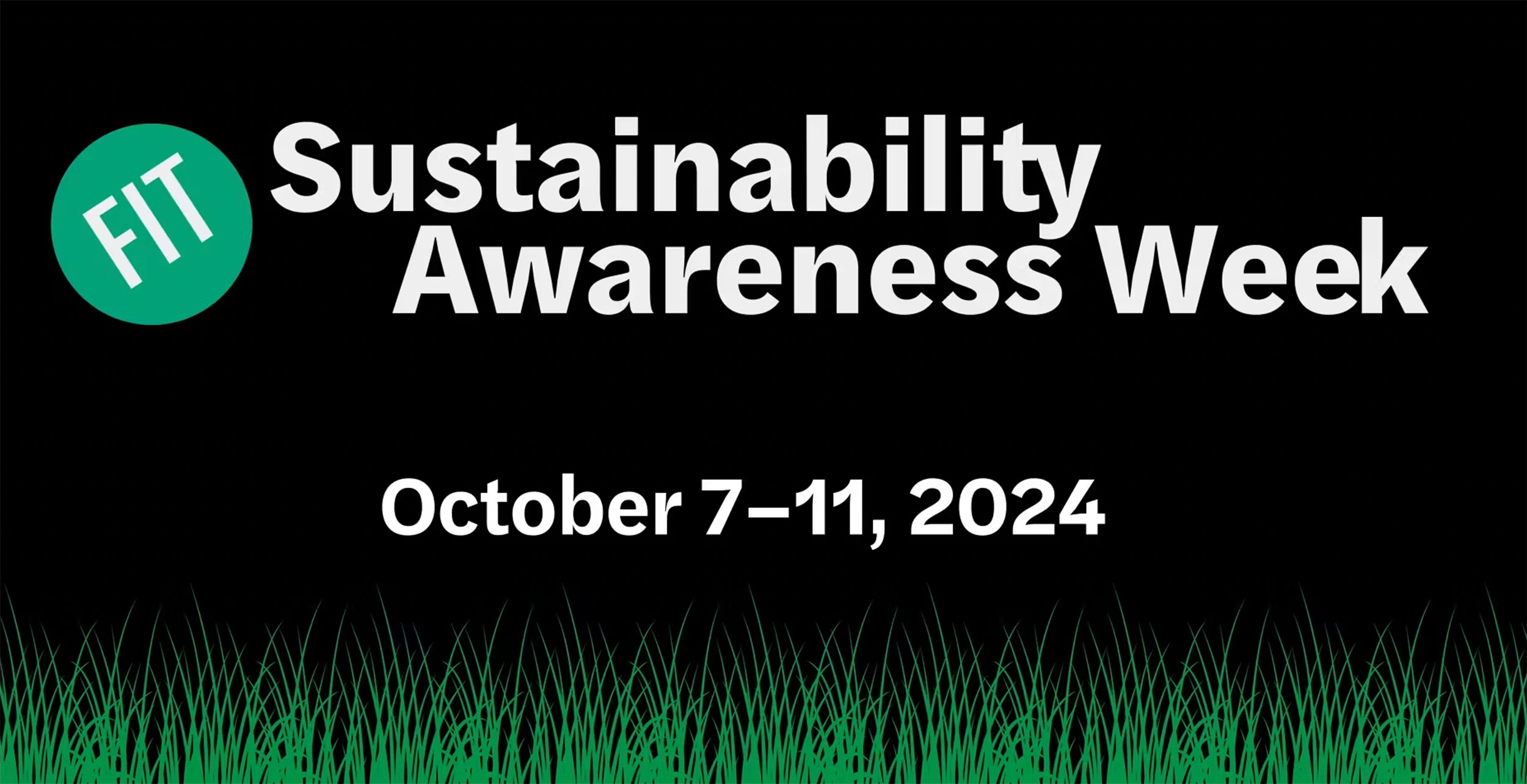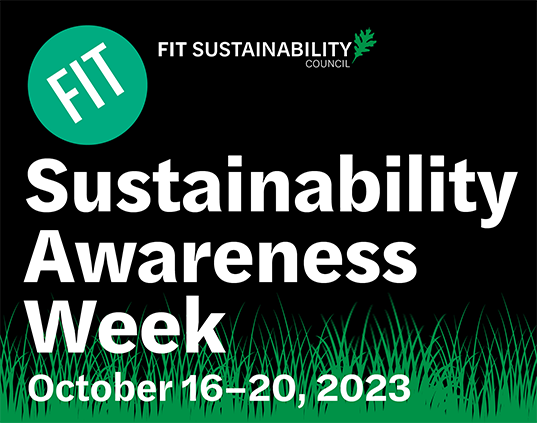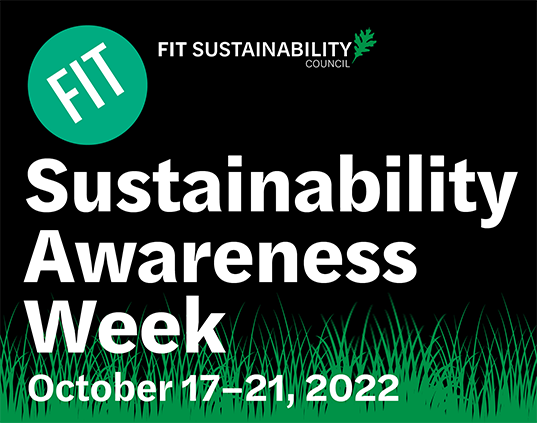Sustainability Awareness Week

Sustainability Awareness Week 2024, which took place from October 7th through October 11th, featured special guest lectures, discussions, tours, workshops, and the sustainability fair. This week of programming—focused on the pillars of sustainability: human, social, economic, and environmental—highlighted sustainability initiatives led by industry leaders, FIT students, faculty, staff.
Check Our Presenters and Panelists
Sustainability Week Schedule of Events
Monday, October 7
Dr. Karen R. Pearson, chair, Sustainability Council; chair, Science and Math
Tuesday, October 8
The Sustainability Fair featured interactive activities led by faculty, staff, students, and alumni to help the campus community learn about sustainability projects, initiatives, and events at FIT.
Event Schedule:
Fabric Swap with FabScrap
Professor Mallorie Dunn and FabScrap invited the FIT community to swap old fabric
for new. Visitors were encouraged to drop unused, clean, usable pieces of fabric,
and pick up something new for free! Participants could grab small-business designer
leftovers free of charge. Let’s stop trashing our old fabrics, and reuse/recycle them
instead!
Mallorie Dunn, adjunct professor, Fashion Design and Center for Continuing and Professional Studies
The FIT Style Shop’s Vintage Sale
The FIT Style Shop invited the campus community for an exclusive vintage shopping
event at the Sustainability Fair. Visitors explored a curated collection of unique,
timeless pieces selected with a keen eye for fashion trends and sustainability. Whether
you’re a vintage enthusiast or new to the scene, this was an amazing opportunity to
score rare finds and learn about the art of vintage buying.
Samantha Gray, vintage head buyer, FIT Style Shop
Visible Mending Table
The average American throws out over 100 pounds of textile waste each year. This doesn’t
have to happen! By learning intentional, creative mending techniques, we can support
United Nations Sustainable Development Goal 12: Responsible Consumption and Production.
Visitors learned how to use embroidery, boro, and sashiko-inspired stitching to artfully
patch denim and other woven textiles. Particpants brought their torn jeans or holey
T-shirts, and mended!
Nomi Dale Kleinman, associate professor, Textile Surface Design
DIY Upcycled Accessories
Participants were invited to construct an upcycled accessory from FIT’s old vinyl
event banners. Using low-waste patternmaking methods, student leaders had designed
a variety of items that visitors to the table could personalize with recycled and
upcycled materials. This was a great way to get hands-on experience with sustainable
construction and circular design, while learning about the environmental and health
impacts of fashion waste and raw-material production.
Sarah Mullins, associate professor, Fashion
Evelyn Rynkiewicz, associate professor, Science and Math
Take the Fill it Forward Challenge
The Department of Student Life and New Student Orientation partnered with Fill it
Forward to inspire the campus community to reuse and make a positive impact on our
planet and its people. Each time the H2O bottle is refilled, you can scan the bottle's
code and watch your environmental-impact efforts rise! Visitors were encouraged to
stop by to learn more about the challenge and pick up their very own impact-tracker
sticker to start making a difference!
Climate Self-Care and Climate Café Info Session
Visitors learned about our campus Climate Café, which provides a supportive space
for students to discuss their climate-change concerns and engage in actionable solutions.
Susan Breton, associate professor, development specialist, Dean of Students Office, Enrollment Management and Student Success
Earth Tone
Participants learned more about the EarthTone project, the colorful solution to some
of the world’s most important problems! An idea that started in SC-101 Bio-Design
has become the bright changemaker for many people struggling with their mental health.
Visitors were encouraged to participate in a community-building activity and raffle
give-away.
FIT Hives
What’s the buzz about FIT’s honey bees? Community members met the beekeepers who tend
FIT’s hives, tasted some honey, and learned why our honey bees are important to us
and the environment.
1–2 pm
Natural Dye Garden Tour and Workshop
Dye Garden Rooftop, Feldman Center, Ninth Floor
Participants toured FIT’s Natural Dye Garden, where they discovered plants and flowers yielding a rainbow of colors for textiles. Participants also had the opportunity to learn a low-impact natural dye method in a hands-on activation. Fill out this interest form to join the Natural Dye Garden mailing list.
Whitney Crutchfield, assistant professor, Textile Development and Marketing
Sustainability Grant Recipients Showcase: 2024–25
Project: Mend Mobile: Creating Circularity in Community
Andrea Diodati, assistant professor, Fashion
Amy Sperber, assistant professor, Fashion
Project: Reducing Digital Pollution: Transforming Awareness Into Action
Stephenie Futch, coordinator of procedure and communication, Information Technology
Griselda Gonzalez, director, Policy and Compliance
Laura Hatmaker, internal communications specialist, Communications and External Relations
Theresa Rinere, administrative associate, Policy and Compliance
Sustainability Opportunities at FIT
Sustainability Grants
Learn how to apply for a $5,000 Sustainability Grant, administered by FIT’s Sustainability
Council in support of projects related to social, environmental, and/or economic areas
of sustainability. Find application details on our website.
Ethics and Sustainability Minor
The minor in Ethics and Sustainability draws on the expertise and critical thinking
of faculty across the campus in all three undergraduate schools. Minoring in Ethics
and Sustainability provides students with knowledge and tools to understand and critically
assess environments, materials, economics, aesthetics, philosophical concepts, social
responsibility, and the impact of actions. The minor is designed to cultivate understanding
of the interconnected topics, information, and applications related to ethics and
sustainability.
Sustainable Materials and Technology Minor
The Sustainable Materials and Technology minor provides an understanding of the different
kinds of challenges faced by our society and teaches students how to apply fundamental
scientific knowledge and practice to help solve real-world problems. This minor will
complement students’ major-course knowledge and prepare them to lead their industries
to a more sustainable future.
Genspace Scholars
The FIT Genspace Scholars Program offers FIT undergraduate students the opportunity
to develop and complete research at the state-of-the-art Genspace Laboratory in Brooklyn
during the spring semester. Learn more about the scholars program and how to apply.
Application details can be found on our website.
FIT GenSpace Scholars
Casey Lardner, PhD, executive director, Genspace
Dr. Karen R. Pearson, chair, Sustainability Council; chair, Science and Math
Student Campus Sustainability Initiatives
Student members of the FIT Sustainability Council showcased student activism actions
to combat climate change and promote the U.N.’s Sustainable Development Goals.
Student Members of the FIT Sustainability Council
The American Association of Textile Chemists and Colorists (AATCC) Student Club Info
Session
Hazel Togman, president, AATCC FIT Chapter
Scrap-Fabric Recycling Program
Isabella (Izzy) FitzSimmons, secretary of sustainability, Student Government Association
David Dubinsky Student Center, Eighth Floor Alcove
Did you know that chocolate is a $150 billion industry that shares many social, economic, and environmental challenges with the $1.7 trillion fashion industry? In this talk, Joy Batashoff Thaler connected the dots across the cacao trade and shared how her background in finance prompted her to start The Pod by CocoaCompassion, her social-impact bean-to-bar chocolate company. Thaler’s natural curiosity has led her to explore ways to use the cacao husk as a natural dye, a soil amendment, a papermaking fiber, and the list goes on.
Joy Batashoff Thaler, founder, The Pod by CocoaCompassion
Naomi Gross, professor, Fashion Business Management
Katie Murphy Amphitheatre
This event featured a conversation with Maxine Bédat, founder and director of New Standard Institute, who discussed her book, UNRAVELED: The Life and Death of a Garment , with FIT’s Sustainability Council Chair, Dr. Karen Pearson.
Maxine Bédat, author; founder and executive director of New Standard Institute
Dr. Karen R. Pearson, chair, Sustainability Council; chair, Science and Math
Wednesday, October 9
David Dubinsky Student Center, Eighth Floor Alcove
Liz Alessi delved into the challenges brands face in their quest to be more sustainable. She also shared some amazing success stories and describe immediate scaled solutions that are addressing challenges in real time, including:
- Value hierarchy—the optimal model to preserve the value of products and materials
- Longevity of product—material choices that help keep your design in circulation as long as possible
- Design for circularity—plan for the end of a product’s life at the beginning of its life
- Post-consumer opportunities—harness the systems that are in place to collect, sort, and disassemble in order to reuse, recycle, or down-cycle
- Carbon reduction—material choices that can result in an immediate 80% carbon savings
Ann Cantrell, associate professor, Fashion Business Management
Liz Alessi, sustainability consultant/sourcing executive/circularity expert/senior investment
advisor
The Museum at FIT (Registered attendees meet in the museum lobby.)
Africa’s Fashion Diaspora looks at transnational Black cultural networks and how Black designers over the 20th and 21st centuries have used their fashion practice to amplify, investigate, and connect Black cultures around the world. One section of the exhibition, “Tun Yuh Han Mek Fashan” (a Jamaican patois phrase), focuses on sustainability, while another section, “Ubuntu,” looks at several fashion brands that aim for social good, often encompassing sustainability as well. This tour will also highlight several designers in other sections, including Sindiso Khumalo (South Africa), Olyubiyi Thomas (U.K.), and Post-Imperial (USA/Nigeria), who also focus on sustainable production.
Elizabeth Way, associate curator, The Museum at FIT
David Dubinsky Student Center, Eighth Floor
Mallorie Dunn, FIT professor and owner of the inclusive small business SmartGlamour, was joined by the owners of the NYC-based, size-inclusive brands Wray, Tamara Malas, and Sue Rock Originals. Attendees learned why inclusive sizing and sustainability must go hand-in-hand and how to make it work for their future business or design career.
Mallorie Dunn, adjunct professor, Fashion Design and Center for Continuing and Professional Studies
Tamara Malas, CEO/owner of Tamara Malas
Sue Rocks, founder, Sue Rock Originals
Wray Serna, American independent fashion designer and entrepreneur
Thursday, October 10
Staff Cloud Cleanup Interactive Workshop
noon–1 pm, lunch will be provided
Conference Center at FIT, Room SR9
Ever feel overwhelmed by digital clutter? It doesn’t just slow you down—it also has an environmental impact. In this session led by Monica Hauck-Wealton, a records advisory officer with the New York State Archives, participants were shown how small changes in their digital habits can simplify work and contribute to a more sustainable FIT. They also learned how to reduce unnecessary emails and files, and discovered the personal and environmental benefits of a cleaner digital workspace. Learn more on our website
Monica Hauck-Whealton, records advisory officer, New York State Archives
Faculty Cloud Cleanup Interactive Workshop
1–2 pm, lunch will be provided
Conference Center at FIT, Room SR9
As educators, your work and communications with students and colleagues are crucial, but they don’t have to come at the expense of our planet. In this session led by Monica Hauck-Wealton, a records advisory officer with the New York State Archives, participants explored how they can reduce your digital footprint by strategically managing emails and other digital files. They also discovered ways to streamline their digital storage by reducing unnecessary emails and files, ensuring that cloud storage is efficient and environmentally friendly. Learn more on our website
Monica Hauck-Whealton, records advisory officer, New York State Archives
Dubinsky Student Center, Room A734
Feeling overwhelmed by climate change? You’re not alone. Join the FIT Climate Café in conjunction with FIT’s Sustainability Council. Our campus Climate Café provides a safe, supportive space for students to discuss their concerns, fears, and ideas related to climate change.
Susan Breton, associate professor, development specialist, Dean of Students Office, Enrollment
Management and Student Success
Muriel Stallworth, educator and artist
The FIT Genspace Scholars Program provides FIT undergraduates the opportunity to develop and complete research at the state-of-the-art Genspace Laboratory in Brooklyn during the spring semester.
Dr. Karen R. Pearson, chair, Sustainability Council; chair, Science and Math
Casey Lardner, PhD, executive director, Genspace
Dubinsky Student Center, Eighth Floor
Participants toured the FIT Green Roofs and learned about their history and how they positively impact our environment.
Al Palmaccio, assistant director of engineering and sustainability at FIT
Feldman Center, Ninth Floor Boardroom
Valentina Henao’s presentation on Naia™ Renew focused on Eastman’s innovative carbon renewal technology and its significant impact on the apparel and fashion industry. Henao discussed how Naia™ Renew is produced from 60% sustainably sourced wood pulp and 40% certified waste materials, making it a highly sustainable choice for the industry. She also showcased Naia™ Renew’s scalability and versatility, emphasizing its ability to be blended with other sustainable fibers. Attendees had the opportunity to explore fabrics and garments in various applications, including ready-to-wear (RTW), casual wear, denim, and sweaters. This talk provided insights into how Fashion Design majors can leverage sustainable materials like Naia™ in their future work.
Valentina Henao, business development manager, textiles, Eastman, International Trade and Marketing for the Fashion Industries ’09
Friday, October 11
Feldman Center, AC08 Woodshop
Faculty, staff, and students across campus work with various materials in their daily activities. How can we safely and sustainably use these materials, while preventing hazardous substances from entering the environment and our lives? This two-part workshop allowed participants to seek answers: First, they built a round table using scrap materials and then gathered around the table for an engaging discussion on sustainable material practices. This workshop also introduced the new course SC 109: Introduction to Materials Toxicology, launching in Spring 2025.
Dr. Julian Silverman, assistant professor, Science and Math
Steven Ceraso, instructor and technologist, Center for Continuing and Professional Studies, Visual
Presentation and Exhibition Design
Learn More About Previous Sustainability Week Events
Questions?
Contact the FIT Sustainability Council at [email protected].

